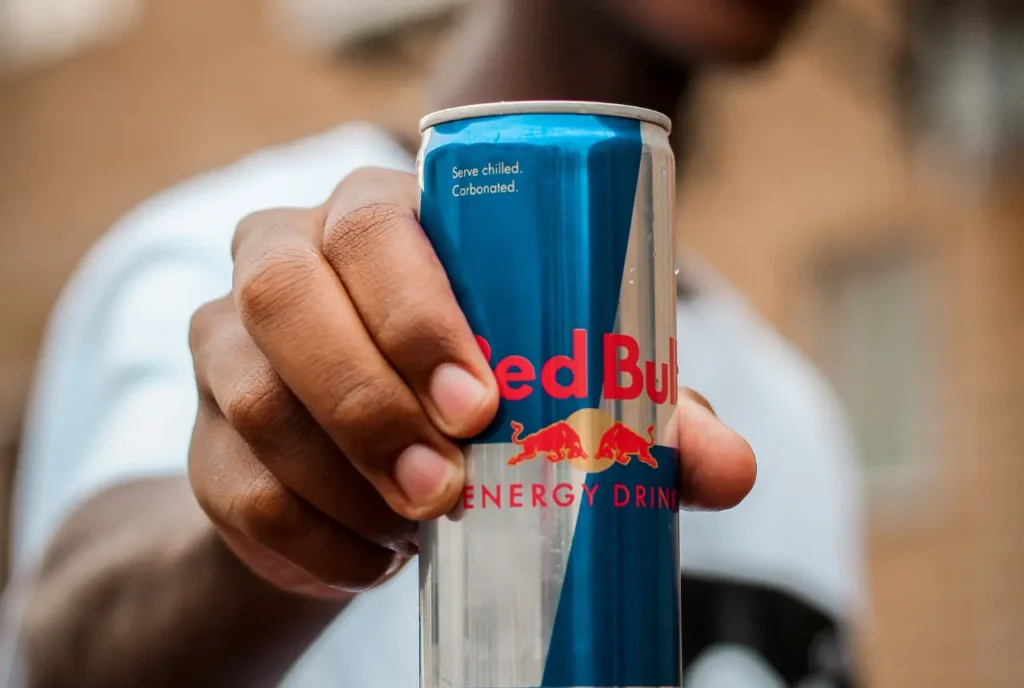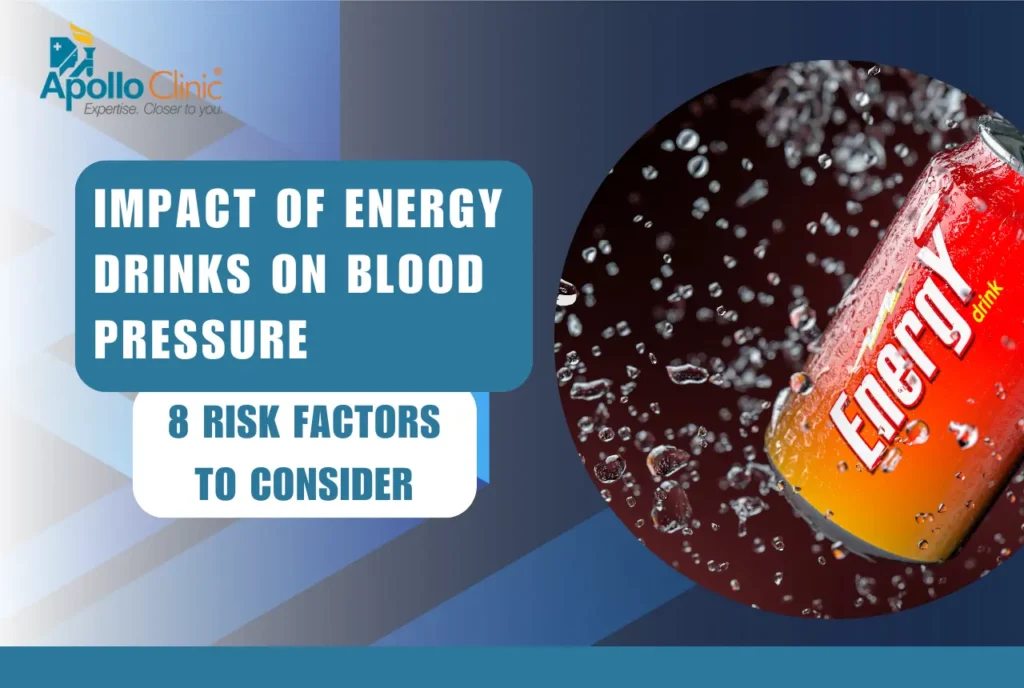Impact of Energy Drinks on Blood Pressure: 8 Risk Factors to Consider
Energy drinks have pretty much become a part of our daily diet, especially in young adults. Whether they are kids going to school, college students, or working adults on a break, an energy drink becomes a necessary part of the day to keep up their energy levels. But, do they only help keep the energy up or raise something else too? As it turns out, the impact of energy drinks on blood pressure is great. Tag along till the end as we discuss every aspect of it.
Beneath the bright packaging and promises of a quick pick-me-up are potential health risks, particularly for blood pressure. This blog post delves into the effects of energy drinks on blood pressure, examining the mechanisms at work and the hazards involved.
These are Some of the Major Impact of Energy Drinks on Blood Pressure

Caffeine, the main ingredient in energy drinks, is a potent stimulant. It works by blocking adenosine receptors in the brain, chemicals that promote sleepiness. This blockage triggers the release of epinephrine (adrenaline), a hormone that increases heart rate and narrows blood vessels, leading to a temporary rise in blood pressure. While moderate caffeine intake might have minimal effects on healthy individuals, excessive consumption, common with energy drinks, can significantly impact blood pressure.
There’s also debate about the long-term consequences of repeated caffeine spikes. Some research suggests potential habituation, where the body adapts, requiring even more caffeine to achieve the same effect, leading to a potential cycle of escalating blood pressure. Further, energy drinks often contain other ingredients like taurine, guarana (another source of caffeine), and sugar, which may interact with caffeine, potentially amplifying its effects on blood pressure. Research continues to investigate these interactions.
A recent study (May 2024) published in the Journal of the American Heart Association found that consuming a large energy drink (32 ounces) led to a significant increase in both systolic (top number) and diastolic (bottom number) blood pressure in healthy young adults, even exceeding the rise caused by caffeine alone. This suggests that other ingredients or their combined effects might contribute to blood pressure changes.
1. Increased Heart Rate and Blood Pressure
Energy drinks pack a double whammy on your cardiovascular system. The caffeine acts like a gas pedal, revving your heart rate and constricting blood vessels, leading to a surge in blood pressure. This sustained pressure can be particularly dangerous for young adults and those new to caffeine, potentially causing headaches, heart palpitations, and even chest pain. Remember, a single energy drink can easily exceed the “safe” daily caffeine intake for blood pressure, typically around 400mg. Consider water or healthier alternatives for a more balanced approach to energy.
2. Interference with Blood Pressure Medication
For individuals already managing hypertension with medication, energy drinks can be particularly risky. Caffeine can interact with certain blood pressure medications, reducing their effectiveness.
This can lead to uncontrolled blood pressure, a significant health threat. It’s crucial to consult a doctor before consuming energy drinks if you take blood pressure medication.
3. Increased Risk of Arrhythmias
Energy drinks pack a hefty caffeine punch, and excessive consumption can significantly raise your risk of arrhythmias, and irregular heartbeats. These disruptions range from mild flutters to life-threatening situations and are especially concerning for those with pre-existing heart conditions.
Think of your heart rhythm like a well-rehearsed orchestra. Caffeine can disrupt the electrical signals conducting the beat, leading to arrhythmias like premature heartbeats or atrial fibrillation (AFib). This risk is amplified for individuals with conditions like coronary artery disease or electrolyte imbalances, where the heart is more vulnerable to these disruptions.
4. Sleep Disruption and Potential for Hypertension
Caffeine disrupts sleep patterns, and chronic sleep deprivation is linked to an increased risk of hypertension. Energy drinks consumed later in the day can significantly impact sleep quality. This sleeplessness on a daily basis can lead to chronic insomnia that can further lead to mental health issues and stress. Getting quality sleep is vital for overall cardiovascular health.
5. Increased Sugar Intake and Blood Pressure Concerns
Many energy drinks are loaded with sugar, a major health concern. Excessive sugar intake is linked to obesity and chronic diseases like diabetes, all of which can contribute to hypertension. While sugar-free versions exist, they often contain artificial sweeteners with potential health concerns of their own.
6. Anxiety and Stress

Energy drinks might seem like a quick fix for fatigue, but the ingredients can trigger a cycle of anxiety and high blood pressure. Here’s why:
- Caffeine: The high caffeine content acts like a stimulant, initially boosting alertness. However, excessive caffeine can lead to jitters, nervousness, and heightened anxiety.
- Stress: Other stimulants in energy drinks can further exacerbate anxiety. This combined effect can leave you feeling on edge and wired.
- The Vicious Cycle: Chronically stressed individuals may turn to energy drinks for a pick-me-up. However, the caffeine crash and rebound anxiety can worsen stress levels. This cycle can lead to dependence on energy drinks just to manage the anxiety they create, ultimately impacting blood pressure negatively.
7. Potential for Addiction and Long-Term Health Risks
Excessive usage of energy drinks on a regular basis might result in dependence and even addiction. Consistently consuming a high amount of caffeine poses significant long-term health hazards, one of which is an increased risk of developing cardiovascular disease. Moderation is essential if you are concerned about becoming dependent on something, and it is recommended that you seek the advice of a healthcare practitioner.
8. Dehydration and Potential Blood Pressure Issues
Energy drinks boast an energy boost, but what they don’t advertise is the potential dehydration lurking beneath the surface. Caffeine acts as a diuretic, a fancy term for increasing urine production. While this may initially lead to feeling lighter, it can quickly lead to dehydration.
Dehydration disrupts your body’s delicate fluid balance, thickening your blood and making it harder for your heart to pump it effectively. This extra strain can lead to fluctuations in blood pressure, potentially causing spikes or dips. Water remains the clear winner for hydration. It replenishes fluids without the negative effects of caffeine, allowing your body to function optimally and maintain healthy blood pressure levels.
Who Should Be Especially Cautious?
Some individuals are more susceptible to the negative effects of energy drinks on blood pressure. This includes:
- People with pre-existing hypertension: Energy drinks can further elevate already high blood pressure.
- Pregnant and breastfeeding women: Caffeine can cross the placenta and is present in breast milk. High caffeine intake can be harmful to developing babies.
- Children and adolescents: Their bodies are still developing, and they are more sensitive to the effects of caffeine and energy drinks.
Conclusion
Energy drinks offer a temporary pick-me-up, but the impact of energy drinks on blood pressure and overall health is significant. These drinks contain a lot of caffeine. While caffeine does stimulate energy levels for a bit, but it actually only works for a short time. Consuming caffeinated drinks late in the day can have an adverse effect on the nervous system.
Be mindful of their consumption and explore healthier alternatives like water, green tea, or fruits for a natural energy boost. Remember, a healthy lifestyle with balanced habits is the key to sustained energy and long-term well-being.





